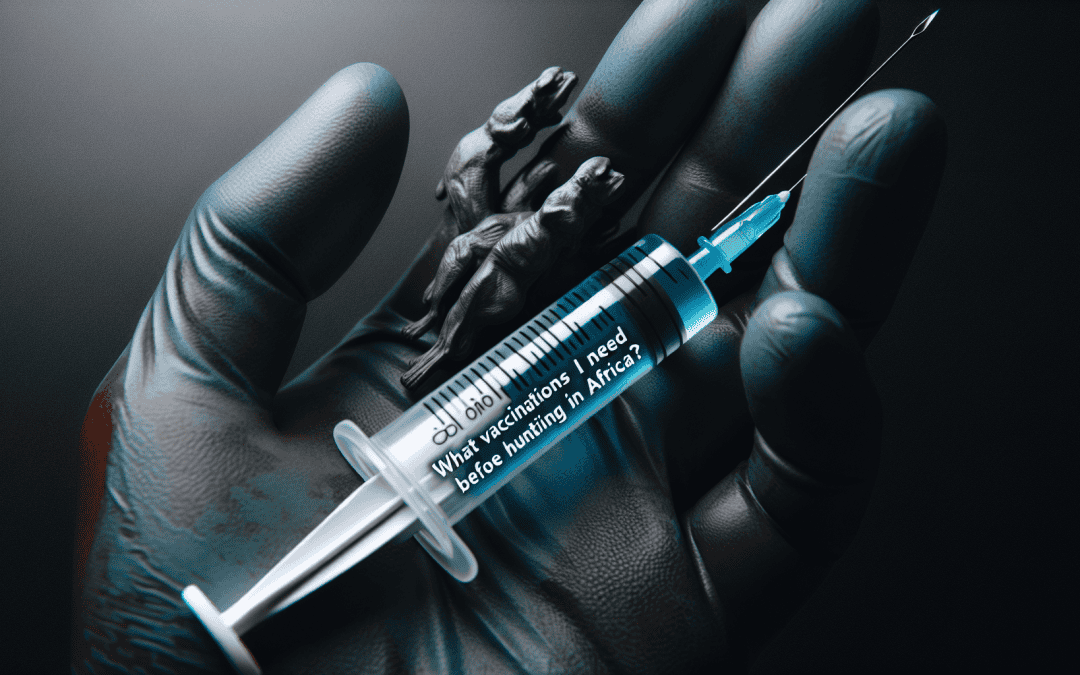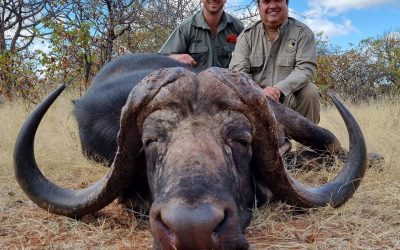So you’ve finally decided to embark on a thrilling hunting adventure in Africa. But before you start envisioning the magnificent landscapes and majestic wildlife, it’s crucial to prioritize your health and safety. In order to minimize the risk of contracting dangerous diseases while you’re in the wilderness, it’s essential to know what vaccinations you need before setting foot on African soil. By taking a proactive approach and ensuring you have the necessary immunizations, you can fully immerse yourself in the marvels of African hunting without compromising your well-being.
Consulting a Travel Medicine Specialist
When planning a hunting trip in Africa, it is crucial to consult a travel medicine specialist. Traveling to a new country exposes you to different diseases and health risks that you may not have encountered before. By consulting a travel medicine specialist, you can ensure that you are properly prepared and vaccinated to protect your health and well-being during your hunt.
Importance of Consulting a Travel Medicine Specialist
Consulting a travel medicine specialist before your hunting trip is important for several reasons. First, they have the expertise and knowledge to assess the specific health risks associated with your destination. Africa is a diverse continent with varying health risks in different regions, so it is essential to get personalized advice based on your hunting plans and destinations.
Second, a travel medicine specialist can review your immunization history and determine if you are up-to-date on routine vaccinations. Ensuring routine vaccinations, such as tetanus and diphtheria, measles, mumps, and rubella (MMR), seasonal influenza, hepatitis A and B, and polio, is vital for your overall health and protection during your trip.
Lastly, a travel medicine specialist can provide travel-specific vaccinations that may be required or recommended for your destination. These vaccinations, such as yellow fever, meningococcal meningitis, typhoid fever, rabies, cholera, Japanese encephalitis, and tick-borne encephalitis, target diseases that are prevalent in certain regions of Africa. By getting the necessary vaccinations, you can minimize the risk of contracting these diseases while hunting.
What to Expect During Consultation
During your consultation with a travel medicine specialist, you can expect a thorough assessment of your hunting plans and destinations. They will inquire about the specific activities you plan to engage in, the locations you will be visiting, and the duration of your trip. This information will help them tailor their recommendations to your unique circumstances.
The travel medicine specialist will also review your immunization history to determine if you are up-to-date on routine vaccinations. They may ask for proof of vaccination or perform blood tests to confirm your immunity to certain diseases. Based on this information, they will discuss any necessary vaccinations you may require for your trip.
Discussing Hunting Plans and Destinations
One of the first topics during your consultation with a travel medicine specialist will be your hunting plans and destinations. Africa is a vast continent with diverse environments and health risks vary from region to region. By discussing your hunting plans and destinations with a specialist, they can provide tailored advice and recommendations to ensure your health and safety while hunting.
They will inquire about the specific activities you plan to engage in, such as hunting in the bush, camping, or traveling to remote areas. Different activities may expose you to specific health risks, such as insect-borne diseases or water-borne illnesses. Based on your planned activities, the specialist can recommend appropriate precautions to minimize these risks.
Additionally, they will discuss the specific regions or countries you will be visiting. Some diseases, such as yellow fever or malaria, may be more prevalent in certain areas. The travel medicine specialist will provide advice on specific vaccinations or prophylactic medications that are recommended for those regions to ensure you are adequately protected.
Reviewing Immunization History
During your consultation, the travel medicine specialist will review your immunization history to determine if you are up-to-date on routine vaccinations. Routine vaccinations are essential for protecting your overall health, and they may also provide some degree of protection against certain diseases you may be exposed to during your hunt.
Common routine vaccinations include tetanus and diphtheria, measles, mumps, and rubella (MMR), seasonal influenza, hepatitis A and B, and polio. These vaccines are typically administered during childhood, but booster doses may be necessary in adulthood to ensure optimal protection. The specialist may ask for proof of vaccination or perform blood tests to assess your immunity status.
If you are not up-to-date on routine vaccinations, the specialist will likely recommend getting the necessary vaccinations before your trip. Having up-to-date routine vaccinations will not only protect you during your hunting expedition but also contribute to your overall health and well-being.
Determining Necessary Vaccinations
Based on your hunting plans, destinations, and immunization history, the travel medicine specialist will determine the necessary vaccinations for your trip. While routine vaccinations protect against common diseases, travel-specific vaccinations target diseases that are prevalent in certain regions or associated with specific activities.
Some of the travel-specific vaccinations you may be recommended for hunting in Africa include:
Yellow Fever
Yellow fever is a viral disease transmitted through the bite of infected mosquitoes. It is prevalent in certain parts of Africa, including popular hunting destinations. Proof of yellow fever vaccination may be required for entry into some countries, and the vaccine provides long-lasting protection. Additionally, protection against yellow fever is essential to protect your health and prevent further transmission.
Meningococcal Meningitis
Meningococcal meningitis is a bacterial infection that can cause severe illness and even death. It is more common in the “meningitis belt” of sub-Saharan Africa. The vaccine provides protection against multiple strains of meningococcal bacteria and is highly recommended for travelers to these regions, especially during the dry season.
Typhoid Fever
Typhoid fever is a bacterial infection transmitted through contaminated food and water. It is prevalent in many developing countries, including parts of Africa. The typhoid vaccine can provide protection against this disease, especially if you will be in areas with poor sanitation or limited access to clean water and food.
Rabies
Rabies is a viral disease transmitted through the bite of infected animals, commonly through dog bites. It is prevalent in many parts of Africa, and hunters may be at a higher risk of exposure due to potential encounters with wildlife. While avoiding animal bites is crucial, having pre-exposure rabies vaccination can provide an added layer of protection.
Cholera
Cholera is a bacterial infection that causes severe diarrhea and dehydration. It is prevalent in areas with inadequate sanitation and hygiene practices. The cholera vaccine may be recommended for travelers to regions with ongoing outbreaks or for those engaging in activities that may increase the risk of exposure, such as consuming raw or undercooked seafood.
Japanese Encephalitis
Japanese encephalitis is a viral infection transmitted through mosquito bites. It primarily occurs in rural agricultural areas, including parts of Africa. The vaccine is recommended for travelers visiting endemic areas or engaging in activities that increase the risk of mosquito bites, such as outdoor activities during dusk and dawn or staying in rural areas for an extended period.
Tick-Borne Encephalitis
Tick-borne encephalitis is a viral infection transmitted through tick bites. It is prevalent in certain regions of Europe and Asia, but cases have also been reported in Africa. If your hunting expedition will take you to areas where tick-borne encephalitis is a concern or if you plan to undertake outdoor activities in those regions, vaccination may be recommended.
Malaria Prevention
Understanding the risk of malaria and taking appropriate preventive measures is crucial during your hunting trip in Africa. Malaria is a mosquito-borne disease caused by a parasite and can be life-threatening if not properly managed.
Understanding the Risk of Malaria
Malaria transmission occurs in many parts of Africa, with certain regions having higher transmission rates than others. The risk of contracting malaria varies depending on the time of year, location, and activities you plan to undertake. It is essential to research the malaria risk in your specific hunting destinations to understand the level of risk.
Taking Prophylactic Medication
Prophylactic medication is an important component of malaria prevention. Consult with your travel medicine specialist to determine the most suitable medication based on the specific malaria risk in your destination. Prophylactic medication should be taken as directed, typically starting before your trip, during your stay in the malaria-endemic area, and for a specific period after leaving.
Using Insect Repellent and Bed Nets
In addition to prophylactic medication, using insect repellent and bed nets can further reduce the risk of mosquito bites and, consequently, contracting malaria. Choose an insect repellent that contains at least 20% DEET and apply it to exposed skin. Use bed nets treated with insecticides to create a physical barrier between you and the mosquitoes during sleep.
Additional Precautions
Taking additional precautions, such as wearing long-sleeved shirts and long pants, especially during times of high mosquito activity (dusk and dawn), can further minimize the risk of mosquito bites. Consider staying in accommodations with air conditioning or screened windows and doors to keep mosquitoes out. Remember to remove any stagnant water around your campsite as it can serve as breeding grounds for mosquitoes.
Additional Precautions and Health Advice
In addition to vaccinations and malaria prevention, there are several other precautions and health advice you should consider when planning your hunting trip in Africa.
Preventing Insect Bites and Illnesses
Insect bites can transmit various diseases, including dengue fever, Zika virus, and chikungunya. To minimize the risk of insect-borne illnesses, use insect repellent, wear protective clothing, such as long-sleeved shirts and long pants, and avoid outdoor activities during peak mosquito times.
Drinking Safe Water and Food Hygiene
Contaminated food and water can cause gastrointestinal illnesses, such as traveler’s diarrhea. Drink safe water by opting for bottled water or using water purification methods, such as boiling or using water purification tablets. Practice good food hygiene by consuming cooked foods, washing fruits and vegetables with safe water, and avoiding street food or undercooked meals.
Protecting Against Sunburn
Africa’s sun can be intense, even during cooler months. Protect yourself from sunburn by using sunscreen with a high SPF, wearing a wide-brimmed hat and sunglasses, seeking shade during the hottest hours of the day, and staying hydrated.
Managing Chronic Medical Conditions
If you have pre-existing medical conditions, ensure that you have an ample supply of necessary medications and any relevant medical documentation. It is recommended to carry a letter from your doctor listing your current medical conditions, medications, and any medical devices you require.
Traveler’s Diarrhea Prevention
Traveler’s diarrhea can significantly impact your hunting trip. To prevent it, practice good hand hygiene, avoid consuming tap water or ice made from tap water, and choose carefully where and what you eat. Consider bringing over-the-counter medication for symptomatic relief if diarrhea occurs.
Required Documentation
Certain documents may be required when traveling to Africa for a hunting trip. It is essential to ensure that you have all the necessary documentation to avoid any travel disruptions or entry issues.
International Certificate of Vaccination
Some countries in Africa may require proof of certain vaccinations, such as yellow fever, before allowing entry. The International Certificate of Vaccination or Prophylaxis, also known as the “yellow card,” is an official document that records your vaccination history. Make sure you have it completed and carry it with you during your trip.
Proof of Yellow Fever Vaccination
Yellow fever vaccination is often required when traveling to or from countries with a risk of yellow fever transmission. This proof may be requested at airports, border crossings, or when applying for visas. Ensure that you have proof of yellow fever vaccination before your hunting trip to Africa to avoid any complications.
Other Relevant Documents
Depending on your destination and travel plans, other documents may be required. This could include a valid passport with at least six months of validity beyond your intended departure date, visas, hunting permits, or any special permits required for transporting firearms or ammunition. Check the requirements of your specific destination and ensure you have all the necessary documentation.
Planning Sufficient Time
Proper planning and allowing sufficient time for vaccinations and consultations are crucial for ensuring your health and safety during your hunting trip in Africa.
Understanding Vaccine Schedules
Some vaccinations require multiple doses or booster shots to provide optimal protection. Understanding the vaccine schedules and recommended interval between doses is important to plan your vaccinations effectively. Consult with your travel medicine specialist to ensure that you have enough time before your trip to complete the necessary vaccinations.
Time Needed for Immunity
After receiving a vaccination, it may take some time for your body to develop full immunity against certain diseases. Some vaccines provide immediate protection, while others require several weeks to build up immunity. Discuss the time needed for each vaccine with your travel medicine specialist to ensure that you are adequately protected before your departure.
Considerations for Multiple Doses
Certain vaccinations require multiple doses, with specific time intervals between each dose. It is essential to plan accordingly to ensure that you complete the full course of vaccinations before your trip. Some vaccines may require starting the series several months in advance, so make sure to schedule your consultation early to allow sufficient time for multiple doses.
Allowing Time for Consultation and Administration
In addition to vaccine schedules, it is crucial to allow time for consultation and vaccine administration. Consultations with a travel medicine specialist may require scheduling an appointment in advance, especially during peak travel seasons. Additionally, some vaccines may not be readily available and need to be ordered. By allowing ample time for consultation and administration, you can ensure that you are adequately prepared before your hunting trip.
Potential Side Effects
Like any medical intervention, vaccinations carry the risk of side effects. While most side effects are mild and temporary, it is important to be aware of potential reactions and know when to seek medical attention.
Common Side Effects
Common side effects of vaccinations include localized pain, redness or swelling at the injection site, low-grade fever, and mild body aches. These side effects usually resolve within a few days and can be managed with over-the-counter pain relievers such as acetaminophen or ibuprofen.
Rare but Severe Reactions
While rare, severe allergic reactions to vaccines can occur. Signs of a severe reaction include difficulty breathing, swelling of the face or throat, rapid heartbeat, dizziness, or hives. If you experience these symptoms, seek immediate medical attention.
Seeking Medical Attention
If you have concerns about any potential side effects or experience any unexpected reactions following a vaccination, do not hesitate to contact a healthcare professional. They can provide guidance and determine if further medical evaluation or treatment is necessary.
Insurance and Medical Evacuation Coverage
Before embarking on your hunting trip, it is important to review your existing insurance policies and consider medical evacuation coverage, especially when hunting in remote locations.
Checking Existing Insurance Policies
Review your existing health insurance policy to understand what coverage you have while traveling internationally. Confirm if it covers emergency medical expenses, hospitalization, and evacuation. If coverage is limited or insufficient, consider purchasing supplemental travel insurance to ensure adequate protection.
Evaluating Medical Evacuation Coverage
Medical evacuation coverage is particularly important when hunting in remote areas of Africa. In the event of a medical emergency that requires evacuation for specialized care, the costs can be exorbitant. Evaluate your insurance policy to determine if it includes medical evacuation coverage or consider purchasing separate coverage to ensure access to timely and appropriate medical care in case of emergencies.
Considerations for Hunting in Remote Locations
Hunting in remote locations may pose additional risks and challenges when it comes to accessing medical care. Ensure that your insurance coverage includes provisions for emergency medical evacuation from remote areas. Research the nearest medical facilities and their capabilities in your hunting destinations to understand the level of care available in case of an emergency.
Summary
Consulting a travel medicine specialist is crucial when planning a hunting trip in Africa. By consulting a specialist, you can address the specific health risks associated with your destination, review your immunization history, and receive necessary vaccinations. Ensuring routine vaccinations, as well as travel-specific vaccinations for diseases like yellow fever and meningococcal meningitis, will protect your health and safety during your hunt. Taking preventive measures against malaria, such as using prophylactic medication and insect repellent, is also essential. Additionally, following other health advice, carrying the required documentation, planning sufficient time for vaccinations, and evaluating insurance coverage will further ensure your personal health and safety throughout your hunting expedition. By prioritizing proper vaccinations and taking necessary precautions, you can fully enjoy your hunting experience in Africa while minimizing health risks.











